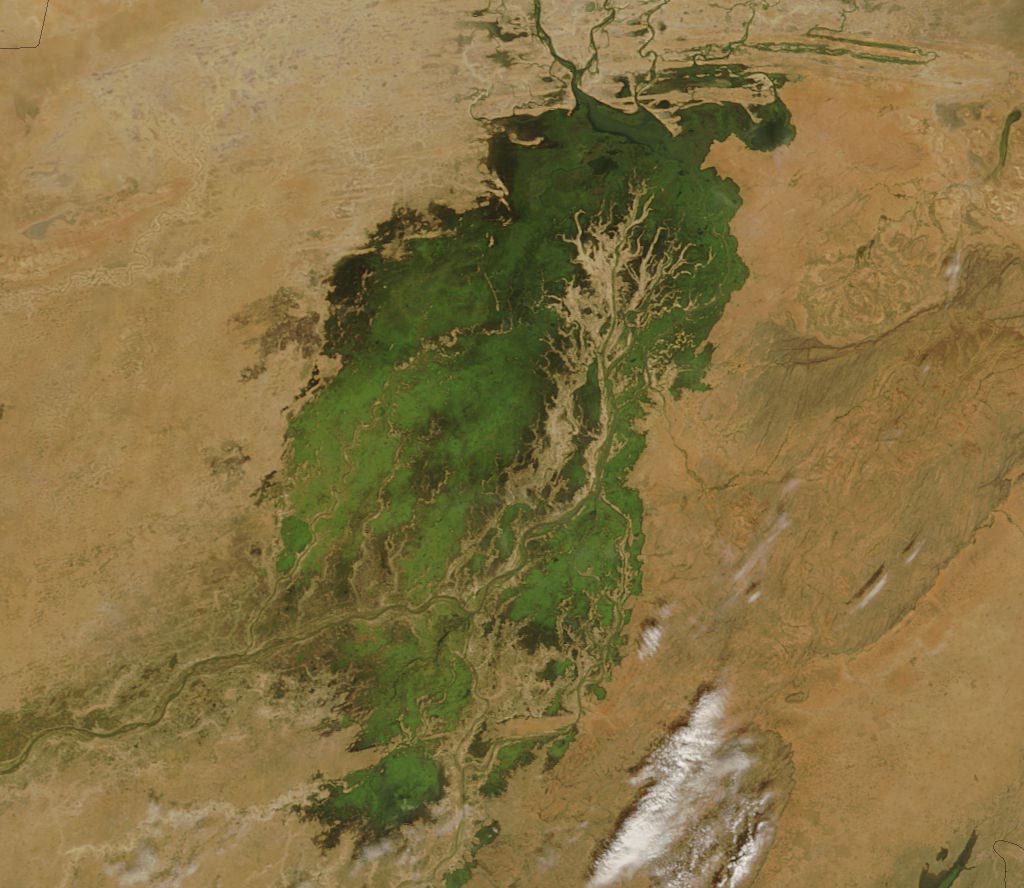Pre-colonial History: Ecological Diversity and Local Autonomy
by Maddie and Ashley
In the beginning . . . the Niger Delta area blossomed with the diversity that only an unmolested land could know. Here this land ran free enlightening the many different spirits that call the Western, Central, and Southern regions of Africa home. In particular, Mami Wata's presence as a water spirit impacts the numerous indigenous groups of the area. When taking a look at this water spirit in relation to a tribe, day in and day out the Ogoni people revere the goddess by not only respecting the land and water but also attempting to understand the elements. By recognizing Mami Wata as a deity of dynamic natures, both good and angry, so is there an understanding of how water can be both calm and thrashing. Understanding how the Niger River Delta once was unscathed and free from colonized influence helps us consider the question of how outside powers have impacted the area: for better or for worse?This land of the spirits ranges with ecological diversity. The Niger Delta is made up of four ecological zones. These zones are coastal barrier islands, mangrove swamp forests, freshwater swamps, and lowland rain forests. With this high concentration of biodiversity in this ecosystem, the delta thrived when it comes to flora, fauna, crops, trees, and had more species of freshwater fish. Such a vast variety of habitat creates the stigma of exoticism Europeans have imagined since the dawn of time. Temptation of the unknown drew in outside powers, developing the long history of colonization that most regions of Africa have come to know. This is all if it had been left untouched by oil companies (Onyiri). Prior to oil drilling taking place in the Niger Delta, the people of the land were able to rely on their resources and they did not need to seek help [or when they needed help they worked with or wrangled with--did the warriors fight with their neighbors?--their immediate neighbors and trade partners?].

[introduce your source with a signal phrase. As of now this is plagiarism.] According to (The population of the delta [today or before contact with Europeans?] makes up more than 23% of Nigeria's total population. This 23% is estimated to be a population of 30 million. The Niger delta region was redefined in the year 2000 to include Abia, Akwa Ibom, Cross River, Edo, Imo, Ijaw, Igbo, and Ondo. Focusing specifically on the Ogoni people, they believe that they have lived on their current land for hundreds of years. Ogoni culture has an emphasis on the training of warriors. Here these warriors are created to serve the beloved spirit Mami Wata. Protecting what Mami Wata represents is a part of the duties of these warriors. Strong relationships with the spirits are important in a number of ways. Members of the community take up roles as priest or priestesses, those with a deep connection to the other world. Spirit mediums are known as advice commanders and intermediaries between spirit and human world [insert parenthetical reference for source].
Ogoni artwork: "Elu Mask"
CONNECTION TO OIL SPILL [beyond your contextual scope] AND IMPORTANCE
[again introduce source with a signal phrase] The chiefs of the Ogoni tribe describe their external and internal wars as a great importance. Traditions are in the form of festivals and primarily pertain to warfare. Young Ogoni men are encouraged to go through initiation into Yaa, Be, or Dogo (depending on origin in Ogoniland), which is a [are?] warrior initiation[s?}. They go through military training and learn to use the kobege, which is a knife, as a weapon of war. Once they display these skills for the public they are seen to be warriors and leaders of each generation displaying discipline and bravery. This initiation still takes place present day.These values of the Ogoni people speaks loudly towards the dynamic, fierce group they have based their foundations on.
In correlation towards the upcoming tragedies of the oil spill in the Niger River, the Ogoni people's economical basis took a spill as well. With the damages to the river in itself, the standard of living has shifted from a fishing standpoint towards farming intensive. Destruction of the rain forest in the Ogoni area has been done in order to make room for farmland. (logbaby.com/Ogonipeople) This section gets beyond the scope of your section and can, therefore, be cut.
PRE MEETS COLONIAL:
[signal phrase for your source] After generations of independence and a culture brewed within, Nigeria was not left alone. Wandering Europeans seeking the riches only the coasts of Africa could provide washed upon the Nigerian coast in hopes of treasure. Treasure indeed they did find: a land rich with flowing rivers, minerals, and exotic animals enlightened the foreigners. The Portuguese became the first of European powers to access Nigeria. (http://www.timeforkids.com/destination/nigeria/history-timeline--cite your source with MLA style please) It was from this time in history that a new, darker chapter of history was written. Long gone were the days of tribal independence and the land free from containment. Enslavement, enforcement, and environmental destruction became the new chapter the Niger River Delta would know after colonization.
Works Cited:
Onyiri, Sunny. "The Paradox of Abundant Oil: The Case of the Niger Delta in Nigeria." Campbellsville University. CampbellsvilleUniversity, 16 Sept. 2013. Web. 10 Apr. 2016.
Salmons, Jill. (2008) "The Role of Mammy Wata as an Agent for the Promotion of Ogoni National Identity." In Drewal, Henry. Sacred Waters: Arts for Mami Wata and Other Divinities in Africa and the Diaspora (423-30). Indiana University Press.